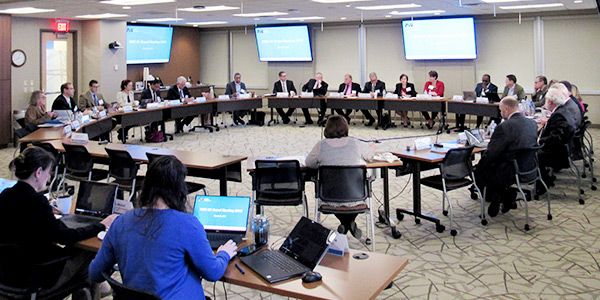By Amanda Durish Cook
ST. PAUL, Minn. — The Midwest Reliability Organization is winding down transition activities after a year of expansion that doubled its territory and regulatory responsibility.
The organization’s Board of Directors voted unanimously Thursday to approve the dissolution of a special oversight committee on the transition of former SPP Regional Entity members to MRO.
Board Chair Silvia Parada Mitchell opened the meeting with an analogy related to weather in Minnesota’s Twin Cities, which were experiencing the first warm days of spring. The board last met during the snowiest February on record for St. Paul, when 9 inches of fresh snow prevented some board members from appearing in person. She likened the weather change to MRO’s recent transformation.
“For us in 2019, that’s what we’re seeing in MRO. We are thriving with the opportunities of last year, and we will continue to thrive,” Parada Mitchell said. “I think this is a great beginning.”
Parada Mitchell pointed to the “expanded and more diverse board,” which now consists of 23 members after MRO leadership added both independent and regional stakeholders to represent newly joining entities.
Board members at the Thursday meeting were arranged in a new roundtable seating format to make it “more inclusive,” Parada Mitchell said.
MRO’s annual report noted the expansion “essentially doubled MRO’s regional footprint and regulatory responsibilities.” The merger “necessitated numerous governance and policy changes” and “provided us the opportunity to rethink MRO’s structure,” Parada Mitchell said.
SPP dissolved its regional entity in late August after citing a mismatch its footprint and that of the RE. MRO took most of its members, with SERC Reliability signing on the remainder. (See SPP Closes Book on Regional Entity.) The move provided MRO with about 100 SPP registered entities and territory in Kansas and Oklahoma, along with parts of Missouri, Arkansas, Louisiana, Texas and New Mexico.
MRO began 2018 with 102 registered entities performing 326 reliability functions and closed the year with 194 registered entities performing 556 reliability functions.
MRO President and CEO Sara Patrick said the organization is currently sharing its lessons learned and transition advice as SERC prepares to absorb the dissolving Florida Reliability Coordinating Council in early summer.
“We’ve been working with SERC to share our experiences,” Patrick said.
MRO in 2018 managed two separate budgets: its usual, preapproved annual budget, and about $2.1 million in transition-related costs, which will be covered by a transfer of assessments from SPP RE. To handle the transition, MRO hired 12 additional staff members and remodeled its St. Paul offices. MRO originally budgeted $1.5 million for the transition.
The merger had impacts on MRO’s 2018 financial performance and revenues. Last year, the organization recorded $15.6 million in operating revenue and $13.5 million in operating expenses, with about $2.7 million in operating income. Baker Tilly partner Nicki Donlon, who completed a February financial audit of 2018 expenses, called the performance a “healthy balance sheet.” Expenses were in excess of MRO’s original $11.7 million budget for 2018. Taken together, the two budgets exceeded the organization’s FERC-approved budget by about 9%.
The organization also recorded about $9 million in assets and $3.7 million in liabilities. By contrast, it had $6 million in assets and roughly $3.5 million in liabilities in 2017, with $10.7 million in operating revenue and $10.8 million in operating expenses, resulting in a small loss in operating income.
MRO said this year it will focus on integrating even more new registered entities. The organization has forecasted spending about $16 million during the year.
Ron Gunderson, chair of the organization’s Reliability Advisory Council, said his group this year will also focus on “near misses” in addition to the usual focus on outright reliability violations. He said the group is interested in events that almost — but not quite — rise to reliability issues.
MRO General Counsel Miggie Cramblit said the organization will also work in 2019 to make introductions to state regulators to increase awareness of its reliability role.
“There’s some confusion that we are MISO instead of MRO,” Cramblit said.
Staff also said they’re considering hosting future workshops and conferences in more southern locations in order to accommodate new members.







